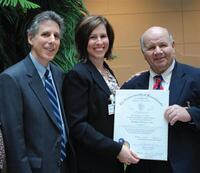Analog Devices
March 26, 2010
Analog Devices Recognized for Environmental Leadership by TURA Program
Company receives award and hosts site tour for state environmental agencies, government officials
Wilmington, Mass. – At a ceremony today, representatives of the Toxics Use Reduction Act (TURA) Program and state legislators presented Analog Devices, Inc. (ADI) with an award to acknowledge the company’s environmental leadership demonstrated by its wafer fabrication facility in Wilmington, Mass.
Analog Devices, a leading manufacturer of high-performance integrated circuits used in analog and digital signal processing applications and headquartered in Norwood, Mass., is one of only 17 companies across Massachusetts being honored during March and April by the TURA Program as a “TURA 20th Anniversary Leader.” The awards and facility tours are intended to showcase environmental accomplishments—use of safer materials, waste reductions and energy savings—since the Toxics Use Reduction Act was enacted into law by the Massachusetts legislature in 1989.
“We selected Analog Devices for the company’s steadfast determination to continually improve performance, from reducing toxics and solid waste to improving efficiencies in water and energy use,” said Liz Harriman, deputy director of the Toxics Use Reduction Institute at UMass Lowell. “The cornerstone of the TURA Program is the planning process, a requirement of the law at which ADI has excelled.”
Since 1990, Analog Devices has made significant reductions in chemical use while doubling production
Since 1990, Analog Devices has made significant reductions in chemical use while doubling production at its fabrication plant site in Wilmington, where more than 1,800 people work. Now, the company finds that these environmental improvements are meeting the demands for “green” products from its customers.
“Because of the TURA framework, we are in a better position to meet customers’ needs for green products,” said Beth Tshudy, Environmental, Health and Safety Manager at Analog Devices in Wilmington. “Our TURA plan wasn’t something we wrote, put on a shelf and then updated in two years. This work is embedded into our management system and measured. This TURA award validates Analog Devices’ long-term commitment to the environment and public health.”
By evaluating safer options and processes, the company has managed to either eliminate or significantly reduce hazardous chemicals used in manufacturing, resulting in use levels below reporting thresholds.
Analog Devices employs the expertise of Marlborough-based environmental health and safety consulting firm Capaccio Environmental Engineering to assist with their toxics use reduction planning.
“ Capaccio continually keeps pace with our needs and has never wavered in the quality of service they have provided ADI over the years,” said Tshudy. “Since the inception of our planning process in 1992, the toxics use reduction planners at Capaccio have kept us on a path of continual improvement, bringing a fresh outside perspective so that the process doesn’t get stale and our company is always innovative.”
The Toxics Use Reduction Act was expanded in 2006 to include conserving water and energy
The Toxics Use Reduction Act was expanded in 2006 to include conserving water and energy — two areas in which ADI has also made improvements at the wafer fabrication facility in Wilmington. By treating and reusing water for scrubbers and cooling towers, ADI has reduced the use of municipal water for industrial facilities equipment by 75 percent. Energy conservation and equipment upgrades have resulted in an overall 10 percent improvement in facility energy efficiency.
The Toxics Use Reduction Act does not ban chemical use but requires companies to evaluate toxic chemical use, submit usage reports and plans to the state that assess the financial implications of switching to safer alternatives or making changes in production. Since 1989, Massachusetts companies voluntarily reduced toxic chemical use by 41 percent, waste by 71 percent and on-site releases by 91 percent.
Twenty years ago, the Massachusetts legislature passed landmark legislation
Twenty years ago, the Massachusetts legislature passed landmark legislation—the Toxics Use Reduction Act (TURA). Today, the TURA Program is considered a model environmental policy by other states and countries. The three agencies below have provided training, grants, technical assistance and support to help companies reduce toxic chemical use and costs, improve health and safety and establish new green markets.
- Toxics Use Reduction Institute (TURI) at the University of Massachusetts Lowell. Provides education, training, and grants for Massachusetts industry and communities; sponsors research and demonstration sites on safer materials and technologies; provides policy analysis; and manages the TURA Science Advisory Board.
- Office of Technical Assistance & Technology (OTA). A non-regulatory agency within the Executive Office of Energy and Environmental Affairs that provides free, confidential, on-site technical and compliance consultations to Massachusetts businesses and institutions.
- Massachusetts Department of Environmental Protection (MassDEP). Certifies Toxics Use Reduction (TUR) Planners, receives and reviews toxics use reports submitted by companies, provides guidance, takes enforcement actions, and collects chemical use data and makes it available to the public.
